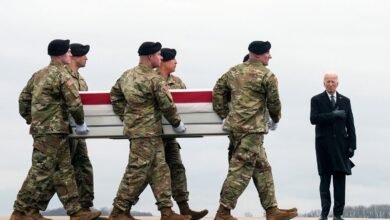Syria’s HTS leader says rebel groups will be ‘disbanded’ to join one army

HTS leader Ahmed al-Sharaa pushed a message of unity in Syria as he sought to reassure minorities in the war-torn country.
Syria’s rebel factions will be “disbanded” and trained to join the “ranks of the defence ministry” said the leader of the Hayat Tahrir al-Sham (HTS) group, which led rebel fighters to Damascus and toppled Syrian president Bashar al-Assad’s regime.
Ahmed al-Sharaa, previously known as Abu Mohammad al-Jolani, added that all fighters would be “subject to the law” as he sought to reassure minorities in Syria that the group would protect citizens and continue state institutions in the multi-ethnic country.
“Syria must remain united,” al-Sharaa said, according to the group’s Telegram channel. “There must be a social contract between the state and all religions to guarantee social justice”.
In a separate meeting, al-Sharaa said that international sanctions against Damascus should be lifted so that displaced refugees could return home.
He stressed the “importance of restoring relations with London” according to comments posted on the group’s Telegram on Monday.
Last week, the UK indicated it would review HTS’ designation as a terrorist organisation, although British Prime Minister Keir Starmer then concluded it was “far too early” to make official assessments of the group.
HTS is a former affiliate of al-Qaida and a listed terrorist organisation in the UK, US and European Union. The group cut ties with al-Qaida in 2016 and has renounced jihadism, although it has still been accused of various human rights abuses, including executions for blasphemy and adultery.
Its designation as a terrorist group carries severe sanctions, including bans on weapons sales and oil imports.
HTS establishes contact
Since taking over power in the stunning overthrow of al-Assad’s regime, HTS has worked to establish a smooth political transition in the country, including working with members of al-Assad’s former government.
Nevertheless, Western countries have been cautious about lifting sanctions against Syria, although many have established initial contact with HTS.
The EU’s new foreign policy chief Kaja Kallas said the bloc should be ready to ease sanctions under the caveat that HTS takes “positive steps” to establish a government that respects women’s and minority rights.
HTS’ spokesman Obeida Arnaout insisted that Syria had entered a new phase and that the government was looking to build good relations with its neighbours, calling the designation of HTS as a terrorist group “not accurate”.
Syria is home to multiple ethnic and religious communities that have spent years pitted against each other by al-Assad’s state and a gruelling civil war.
The US-backed, Kurdish-led forces in northeast Syria are one such minority that control the semi-autonomous region and oversee detention centres housing IS militants.
Clashes over territory have already taken place in some areas between Kurdish forces and the armed groups that overthrew al-Assad.
Arnaout insisted that Kurds are part of the Syrian people and their rights will be protected but added that the new government would not accept any part of Syria to be outside of Damascus’ control.
“Kurds are one of the components of the Syrian people and we are very keen that this group has its rights protected,” he said. “The social fabric in Syria is a source of strength and not weakness. But we affirm that we don’t any part of Syria to be separated.”
The UN envoy for Syria, Geir Pedersen, said Monday he met with the HTS leader and has since called for the lifting of international sanctions on Syria to allow for faster rebuilding.
Meanwhile, a UK-based war monitor said on Monday that Israeli strikes which hit missile warehouses inside Syria were the “most violent” since 2012.
Israeli Prime Minister Benjamin Netanyahu has insisted that the strikes are necessary to combat groups that threaten Israeli interests by filling a “power vacuum” left behind by al-Assad.
Israeli troops have also seized a border buffer zone in the country, sparking condemnation from critics who say the move could constitute an exploitative land grab.
Source link



